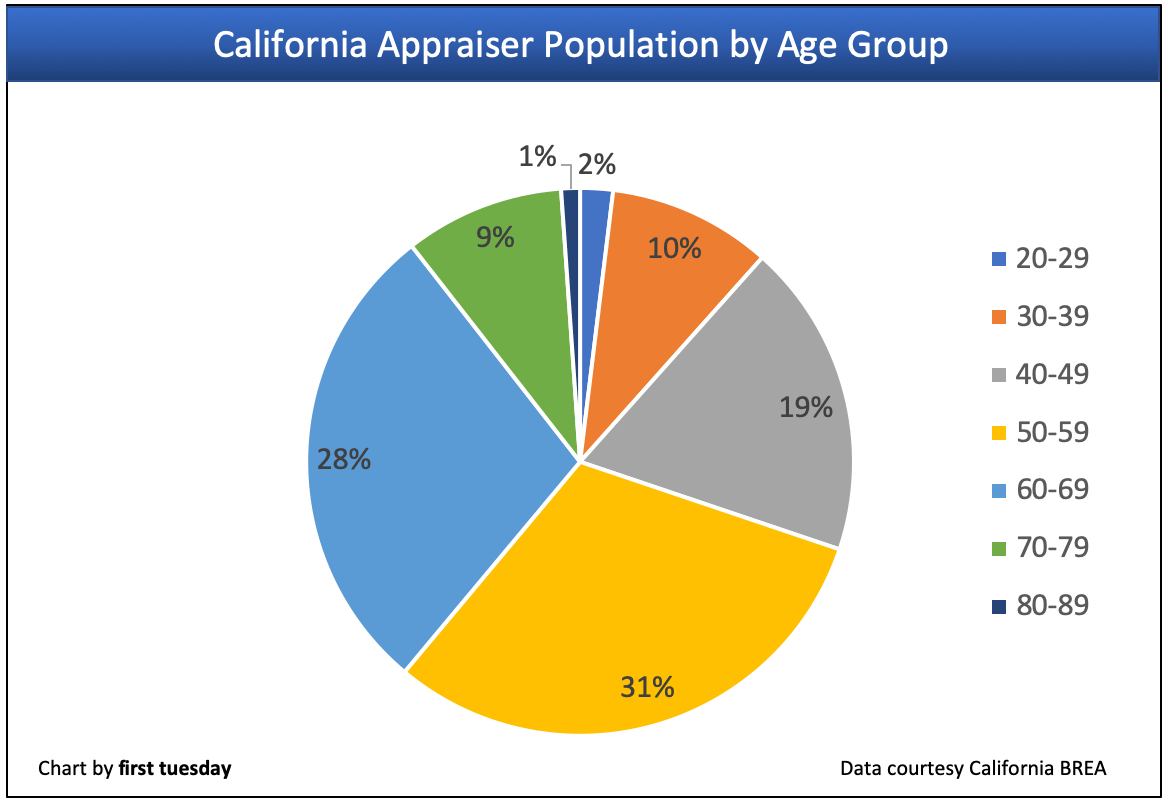The number of licensed appraisers in California is the lowest since the Bureau of Real Estate Appraisers (BREA) began recording the appraiser population in 1993.
At the end of 2019, just under 10,000 appraisers were licensed in California, half the number of those licensed in 2007, according to the BREA Winter 2019 Newsletter. It’s estimated that only about 8,000 of these licensees are active.
Much like the real estate agent population, California’s appraiser population is cyclical in nature. When home sales and prices fall, appraisers retreat in search of more lucrative work. When home sales are hot, new appraisers pour in.
Thus, some of the decline of the past decade is due to significantly fewer home sales during the 2010s relative to the buying and selling frenzy of the Millennium Boom. For reference, home sales volume in the state has been stuck at roughly 60% of the Millennium Boom peak since 2010.
But our flat home sales volume only explains part of the appraiser decline. A more worrying influence is related closely to demographics, as fewer new appraisers are entering the labor force than are retiring.
Appraisers who are approaching retirement age are an outsized share of the total population:

The largest share of the population — 31% — is 50-59 years old. The second-largest share is even closer to retirement, in their 60s. In contrast, early career appraisers in their 20s and 30s make up only 11.5% of the total population, equal to just 1,500 appraisers in the entire state. Further, when excluding appraisers who are still trainees from the total, there are more licensed appraisers in their 80s than there are in their 20s.
Where have all the appraisers gone?
From another perspective, for every active appraiser, 55 home sale transactions closed in California during the last year. Of course, not all of these transactions required an appraiser, and according to BREA Chief, that’s part of the reason for the declining population. Specifically, appraisers are in less demand since technological advances and shifting lending requirements lessen the need for official appraisals. In many cases, a simple broker price opinion — which is usually cheaper and quicker — will suffice.
However, this lessened demand is not echoed in the nonresidential sector. Appraisers seeking steady fees continue to rely on commercial and multi-family transactions, which require thorough and complex appraisal reports.
Will California’s current low appraiser population continue? Or has it reached a bottom?
As about 38% of the appraiser population (aged 60-79) is set to exit the labor force in the coming decade, it’s unlikely we’ve seen the bottom yet. But once home sales volume picks up during the rebound from the next recession, new appraisers will be enticed to enter, somewhat closing the gap, but probably not entirely.
It’s an exciting time for the appraisal industry. With growing technologies and the promise of appraiser turnover on the horizon, more changes are certain to come.
Related article:















why do journalists make a statement like it’s a fact, but then retract it with a different statement. It is but it isn’t. If you report on something then get all the facts. Don’t guess. Your readers are not stupid.
I’ve been an appraiser for over 35yrs. 2022 has been my worst year since 2009. 2023 is shaping up to be much worse! I’m personally tired of government regulations. I would wager to bet that the number of retirements out of appraising will be huge this year. Which will be good for the ones who remain…at least for a while. It’s been a good run for me but 2024 may be my last year which is when my lic. Expires. I will be 66
Appraisers are also at the bottom of the food chain below the attorneys, developers, bankers, builders, architects, agents, etc. They struggle to make a few $100 a day among an oversupply of appraisers. So this is actually good news and not a problem that the number of appraisers is lessoning.
The article missed the main reason for the decline in the number of appraisers: barriers to entry. Becoming an appraiser requires 2000 documented apprentice hours, and it is very difficult to find an appraiser who will take on an apprentice, primarily because the apprentice must sign appraisals and many lenders/appraisal management firms do not allow the assigned appraiser to delegate the work. Given the value of relationships in the intermediary era, it’s a rare appraiser who will risk a profitable relationship for no benefit.
I agree with Kevin deHaeseleer, the entry into the business is not attractive enough and the veteran appraiser doesn’t have much of an incentive for training apprentices.
Kevin is absolutely correct. The Consumer Protection people have made it extremely difficult for an Appraiser Trainee to get experience hours. No licensed appraiser has time to be responsible for a new appraisers work..to supervise, etc. I went through the whole ball of wax, spent hours studying, traveling and paying for all the classes, etc. I took the test for Appraiser Trainee, passed, got Trainees license…but that’s where it Ended. I approached many licensed appraisers about supervising me so I could get my hours. What I got was “I have my own work to do, I don’t have time to supervise or mentor you, and there is not enough work anyway.” They were worried about someone taking THEIR work. I offered to pay them, but it was all negative.. I was an older woman and was totally discouraged from becoming licensed. Look at the page of requirements for new appraisers. Getting my real estate Brokers license was a snap. I had to have experience hours, but those were easily gotten by working under another’s Broker license when I had a sales license. When I worked under a real estate broker, the broker was paid if I sold a house. Appraisers don’t make enough money to share.
I wonder how much they make? Never asked them before.
Now I understand there is a middle man between the appraiser and the bank. An agent
One can no longer go out and hire an appraiser directly. Have to go through a “management” company. I don’t have all the information about this because I was too discouraged to bother finding out. In the days Before an Appraiser Trainee license was required, An appraiser maybe made $350.00 to do an appraisal. Usually the real estate agent called someone from a list of appraisers directly, after getting the clients signature for the appraisal to be done. A buyer would have shopped banks for a purchase loan, so that bank would be given a copy of the appraisal. Now, I don’t know how much the appraiser gets paid, or how much the middle man gets paid. This is how bureaucratic departments are formed, This also raises the cost of the appraisal, but the appraiser might get less for his/her work. I would appreciate an explanation if anyone knows how this works.